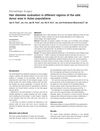 August 2024 in “Current Protocols”
August 2024 in “Current Protocols” The C3H/HeJ mouse model is useful for studying and testing treatments for alopecia areata.
 June 2024 in “International Journal of Nanomedicine”
June 2024 in “International Journal of Nanomedicine” CRISPR/Cas9 has improved precision and control but still faces clinical challenges.
 December 2023 in “Azerbaijan Pharmaceutical and Pharmacotherapy J”
December 2023 in “Azerbaijan Pharmaceutical and Pharmacotherapy J” The minoxidil gel could be a better treatment for hair loss than traditional forms.
 November 2023 in “Journal of cosmetic dermatology”
November 2023 in “Journal of cosmetic dermatology” Fat transplants using a patient's own fat can rejuvenate and repair tissues effectively.
 November 2023 in “ACS Omega”
November 2023 in “ACS Omega” New liposome treatment successfully delivers CRISPR to deactivate a key enzyme in androgen-related disorders.
 November 2023 in “Materials Today Bio”
November 2023 in “Materials Today Bio” Light therapy might help treat hereditary hair loss by improving hair follicle growth in lab cultures.
 October 2023 in “Biomaterials”
October 2023 in “Biomaterials” Nanotechnology could improve hair regrowth but faces challenges like complexity and safety concerns.
 October 2023 in “Bioactive Materials”
October 2023 in “Bioactive Materials” The new hair loss treatment combining nitric oxide and minoxidil in a special carrier is effective for hair regrowth.
 September 2023 in “Pharmaceuticals”
September 2023 in “Pharmaceuticals” Tiny particles improved delivery of hair loss treatments to hair follicles, with lipid-based particles performing best.
 August 2023 in “Stem Cell Research & Therapy”
August 2023 in “Stem Cell Research & Therapy” A substance called Cell-free fat extract can effectively treat common hair loss by increasing hair growth and density.
 July 2023 in “Stem Cells Translational Medicine”
July 2023 in “Stem Cells Translational Medicine” Mesenchymal Stem/Stromal Cells (MSCs) help in wound healing and tissue regeneration, but can also contribute to tumor growth. They show promise in treating chronic wounds and certain burns, but their full healing mechanisms and potential challenges need further exploration.
 June 2023 in “Stem cell reviews and reports”
June 2023 in “Stem cell reviews and reports” Stem cell therapies could be a promising alternative for hair loss treatment, but more research is needed to understand their full potential and safety.
 May 2023 in “Frontiers in Immunology”
May 2023 in “Frontiers in Immunology” Treg cell-based therapies might help treat hair loss from alopecia areata, but more research is needed to confirm safety and effectiveness.
 January 2022 in “Sustainable development goals series”
January 2022 in “Sustainable development goals series” The document concludes that significant investment in agricultural innovation is necessary to achieve global food security and nutrition.
Stem cell treatments show promise for hair loss but need more research.
January 2023 in “Dermatologic Therapy” Intralesional corticosteroids and 5-alpha-reductase inhibitors are the best treatments for frontal fibrosing alopecia.
December 2022 in “Scientific Reports” Compound 4 is a promising treatment for hair loss with low toxicity.
 9 citations,
April 2017 in “International Journal of Dermatology”
9 citations,
April 2017 in “International Journal of Dermatology” Different areas of the scalp have varying hair thickness, useful for different types of hair transplant needs.
 August 2016 in “Journal of Investigative Dermatology”
August 2016 in “Journal of Investigative Dermatology” Researchers found a new genetic mutation linked to a hair condition in a Japanese boy.
 378 citations,
November 2011 in “Human reproduction update”
378 citations,
November 2011 in “Human reproduction update” Experts recommend using evidence-based methods to diagnose and treat hirsutism, focusing on symptoms and underlying causes.
 January 2015 in “Indian Journal of Medical Biochemistry”
January 2015 in “Indian Journal of Medical Biochemistry” Men with early balding should be checked for metabolic syndrome, as there's a link between the two.
 129 citations,
January 2019 in “Clinical medicine insights”
129 citations,
January 2019 in “Clinical medicine insights” Obesity worsens PCOS symptoms, and PCOS may lead to more weight gain; managing both requires a holistic approach that includes mental health.
 December 2011 in “The Diabetes Educator”
December 2011 in “The Diabetes Educator” The Blood Glucose Management Service improved patient safety and outcomes in managing blood sugar in hospitalized patients.
 8 citations,
January 2020 in “Skin Pharmacology and Physiology”
8 citations,
January 2020 in “Skin Pharmacology and Physiology” Caffeine improves hair growth, thickness, and reduces shedding.
 36 citations,
November 2009 in “Journal of Investigative Dermatology”
36 citations,
November 2009 in “Journal of Investigative Dermatology” Prolactin may affect hair growth differently based on gender and scalp area.

Hair analysis can help identify specific minerals and amino acids linked to various diseases.
 8 citations,
January 2015 in “Journal of Cutaneous Medicine and Surgery”
8 citations,
January 2015 in “Journal of Cutaneous Medicine and Surgery” Hair restoration techniques have improved but still rely on limited donor hair, with new methods like cloning and gene therapy being explored.
 14 citations,
September 2015 in “Expert Opinion on Therapeutic Targets”
14 citations,
September 2015 in “Expert Opinion on Therapeutic Targets” The conclusion is that while oral contraceptive pills are effective for PCOS-related high androgen levels, new treatments with fewer side effects are needed.
 2 citations,
October 2018 in “Springer eBooks”
2 citations,
October 2018 in “Springer eBooks” Cancer treatments can cause skin-related side effects that may affect patient quality of life and require changes in treatment.
 47 citations,
September 2016 in “Reviews in endocrine and metabolic disorders”
47 citations,
September 2016 in “Reviews in endocrine and metabolic disorders” The skin's ability to produce hormones is linked to various skin conditions, and better understanding this process could lead to new treatments.



























